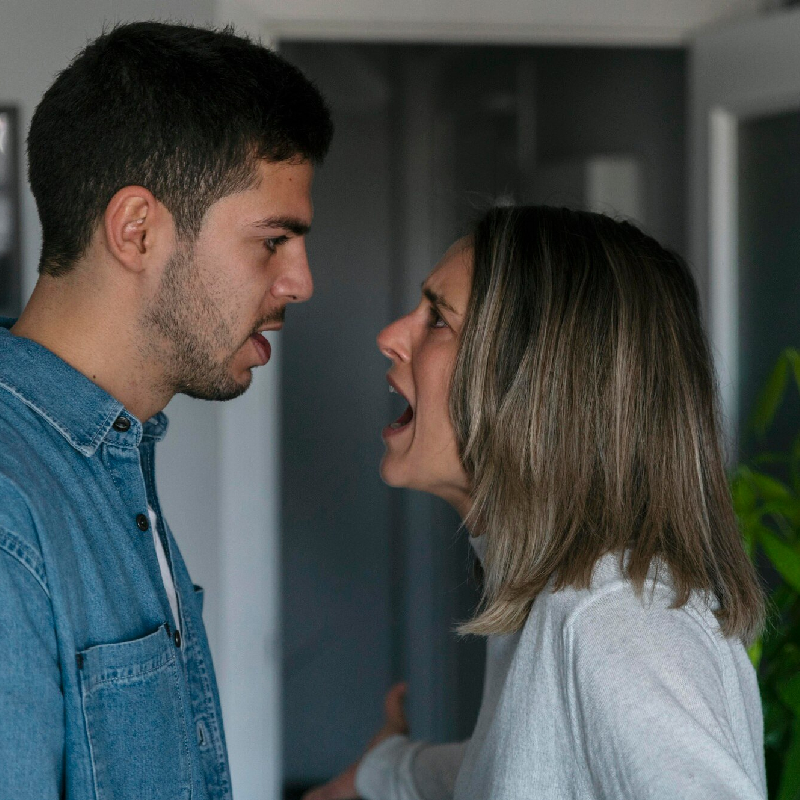Do you allow your children to get angry with you??
Are you able to be present and accompany his rage, Don't take it personally and help them process the energy that accompanies this emotion without repressing it., reject it or get angry yourself?
This may be one of the biggest difficulties we face..
If we are not able to do it, Soon we will see how our children develop a false self with which to hide and protect themselves., keeping that anger that will take two directions; will go inside, towards themselves or towards others who are more vulnerable.
If you have not been able to develop a healthy relationship with your own anger, It is very difficult for you to be able to bear it in them..
Laurence Heller, developer of the NARM model to treat developmental trauma, invites us to explore our relationship with anger through these questions:
- Do you tend to turn your anger against yourself or direct it against others??
- If you get angry easily, Anger is probably a default emotion for you., So it is very useful to do a personal exploration of what you really feel when you automatically resort to anger..
- If you criticize yourself, you judge or hate yourself, then you are turning the anger against yourself. If this is your pattern, That means you have a lot of fears about anger.. An exercise that may be useful for you is to write down all the fears about anger that come to mind.. Write down why it is not safe to feel or express anger..
- If you have strong internal inhibitions against rabies, Try to think of a situation in your life where, unlike usual, you would express a protest that would have a positive result.
- Explore your family of origin's relationship with rabies. In some families no one is allowed to be angry., and in others, everyone is always angry. There are others in which only one or both parents may be angry, but not the children.
Children who are not allowed to get angry and express rage are unconsciously forced to separate themselves from that emotion., which is why the natural fight response that emerges when something makes us angry is incomplete, Children are forced to inhibit these natural anger responses against their parents in order to maintain the attachment relationship and their feelings of love..
The message they receive is that if they get angry they will be rejected, not valued and their protection is withdrawn and that is something they cannot allow. Anger will henceforth be associated with a feeling of anxiety since repudiated anxiety and anger generate a source of chronic fear..
In therapy we work with the adult conscience that is capable of maintaining love and hate at the same time., tenderness and rage, to be able to explain to “the inner adult” This dynamic that he lived and learned from the relationship with his parents and reference adults and that he has internalized towards his own anger.
We often discover that when we resolve those patterns of separation and can integrate that emotion and its bodily expression, fear and anxiety decrease as well as the tendency to hate oneself and harshly criticize oneself.
Many people are not even aware of having repressed anger within us., some clues can help us open ourselves to explore with curiosity.

But the importance of having a healthy relationship with the emotion of anger goes beyond our ability to sustain it in our children..
In numerous cancer studies, the most important risk factor is the inability to express emotion, especially feelings associated with anger. Anger repression is not an abstract emotional trait that mysteriously leads to illness, but it is one of the biggest risk factors, because it increases physiological stress on the body, Gabor Maté explains to us in his book When the Body Says No.
Being in contact with children's anger can be one of the most exhausting things about parenting and accompanying their development., however, as we have seen, train and treat ourselves to be able to remain present and allow its healthy expression without falling into repressing or rejecting it..
Understanding that when a child is angry they say things that have nothing to do with their self and the love they feel for us., exactly the same as adults we do and allow ourselves. Helping you channel your body energy without hurting or harming yourself.
And when he is calmer and his brain is able to observe what has happened without identifying with the emotion, we can name how his reaction has made us feel and help him understand that it is okay to get angry., that we love him/her unconditionally and that there are things he/she says or does when he/she is angry that have hurt us.
Thus favoring the repair. Not to make them feel bad and blame them for what has happened. But to begin the repair process that every break in the connection in the relationship needs..
Every relationship, also ours with our children, goes through a constant and natural cycle of
Connection- Rupture- Connection repair
We need to be able to allow these ruptures to occur and as adults take advantage of them as opportunities for growth., relational flexibility and resilience.



